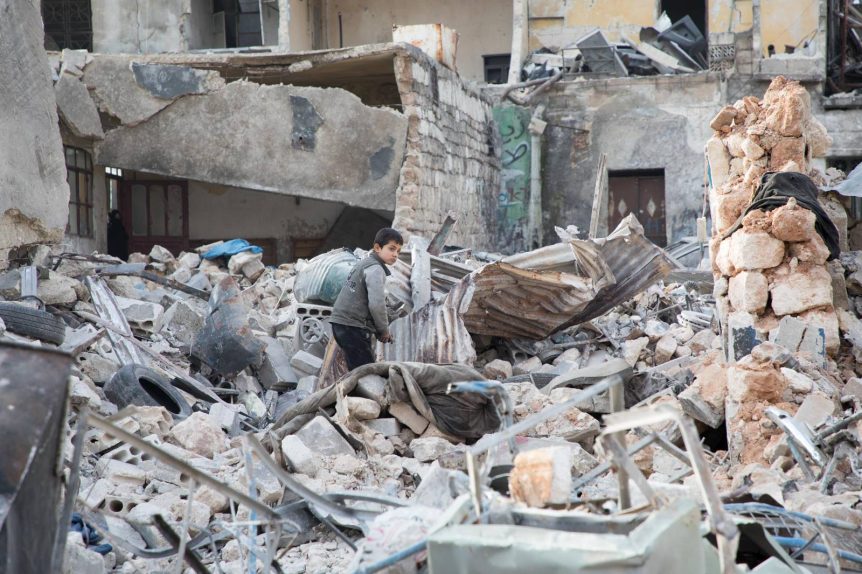The Cairo Institute for Human Rights Studies (CIHRS) asserts that the recent escalation of hostilities in Northwestern Syria, beginning on 27 November between opposition factions and the Syrian government forces and their respective allies, lays bare the enduring cost of an unresolved conflict, where the Government of Syria’s impunity and the international failure to enforce accountability have sustained a fragile and unjust status quo.
The dire humanitarian and political situation in places like Aleppo or Idlib, long before the recent flare-up, reflects the systemic neglect that continues to fuel instability. Thirteen years on, the need for a just and comprehensive political solution is as critical as ever. This renewed violence further exacerbates Syria’s enduring humanitarian catastrophe and underlines the urgent need for a political solution that safeguards civilian lives, stops further devastation, and holds all perpetrators of atrocities accountable.
On 27 November, the conflict in Northwestern Syria escalated into violent armed clashes leading to significant shifts in territorial control between opposition factions and government forces, following the opposition’s ‘Deterring Aggression’ operation led by Hay’at Tahrir Al-Sham (HTS). Since then and as of 1 December, more than 44 civilians were killed – including at least 12 children and seven women – and over 48,500 people were displaced. Access to critical services was disrupted amid a dire humanitarian crisis – where the United Nations estimates over 16.7 million persons across Syria are in need of humanitarian assistance.
“Ensuring accountability at the highest levels, including President Bashar Al-Assad and his key enablers, is the cornerstone of any viable path toward a sovereign, democratic Syria. Without justice for the countless atrocities committed, the vicious cycle of oppression and conflict will persist, and risks plunging the country into further chaos,” says Amna Guellali, Research Director at the Cairo Institute for Human Rights Studies.
In 2014, a France-led effort, co-sponsored by 65 member states, sought to refer the situation of Syria to the International Criminal Court (ICC) through the UN Security Council. However, this effort failed due to the vetoes of Russia and China. Since then, accountability efforts in Syria continue to be obstructed by key players in the conflict, including Russia and its allies, US and its allies, as well as Arab states.
Another potential path to justice for non-members to the ICC may have been found, although it is yet to be upheld by a Higher Chamber. As highlighted in a recent report by Legal Action Worldwide. In the case of Myanmar v. Bangladesh (2019), the Pre-Trial Chamber asserted jurisdiction over Myanmar, despite not being a party to the ICC, due to the cross-border nature of the crimes affecting a state party, Bangladesh. Similar to Myanmar, the Government of Syria’s brutal crackdown on opposition, and its systematic attacks on civilians including through indiscriminate bombings, chemical attacks and torture, have led to the mass displacement of hundreds of thousands of Syrians into Jordan. Jordan, as a member state of the ICC, could allow for the ICC to open an investigation into the crimes of deportation as well as persecution and other inhumane acts, which originated in Syria and ended in Jordan.
The ongoing escalation highlights a broader failure of the political process, exacerbated by foreign interference and the Syrian government’s entrenched impunity. Despite the UN Security Council Resolution 2254 (2015),calling for a nationwide ceasefire and an inclusive political resolution, progress has stagnated. Foreign interventions, both through proxies and direct involvement, have compounded the crisis, thwarting peace efforts.
Syrian citizens are entitled to a genuine, Syrian-led peace process as outlined in the Vienna Declaration (1993), which upholds the right of all people to self-determination. Achieving this requires more than resolutions; it demands meaningful engagement from regional and global powers. The normalization of ties with Assad’s regime, however, has further hindered progress. Syria’s 2023 re-admission to the Arab League and recent diplomatic overtures from EU states signal a troubling acceptance of impunity for the regime’s actions. This normalization is also exemplified by the efforts of several states, notably EU member states, to designate Syria as a ‘safe place’ for refugee returns.
Background
Prior to the escalation on 27 November 2024, Aleppo and its surrounding regions experienced significant hostilities, including airstrikes and bombings by Syrian government forces and allied Russian forces. These attacks targeted both military positions and civilian infrastructure, leading to numerous casualties and displacement.
The Government of Syria, headed by President Bashar Al Assad, is responsible for decades of gross human rights violations and intense repression of the opposition. Before the start of the conflict in 2011 and especially since, Assad’s government has extensively and systematically targeted opposition, including human rights defenders and journalists, through intense censorship, arbitrary detention, forced disappearance, torture, and systematic discrimination on the basis of ethnicity and religion. Assad’s government has notoriously perpetrated multiple war crimes during widespread and systematic military assaults against the opposition and indiscriminate aerial attacks on civilians, including using chemical weapons.
Hay’at Tahrir Al-Sham (HTS) is a militant group mainly operating as a de-facto quasi-administrative authority in its controlled areas in Northwestern Syria. It rebranded itself from a former transnational Salafi-Jihadi group to a more Syria-centric, Islamist group and has since increasingly sought a more moderate public image. Its predecessor was Jabhat al-Nusra, which had the goal of overthrowing the Assad regime and creating an Islamic state. It has been listed as a terrorist group by many actors, including the UN Security Council and the EU. In August 2024, the Commission of Inquiry in Syria found reasonable grounds to believe that HTS continues to commit acts of enforced disappearance, torture, and summary executions in what may amount to war crimes.
Since the escalation of hostilities last week, Hay’at Tahrir Al-Sham (HTS) has pledged to protect minorities from any attacks or threats based on their ethnicity or religion, including Shiite Muslims, Christians and Kurds, vowing that they are an ‘integral part of the diverse Syrian identity’.
Share this Post

